Publications
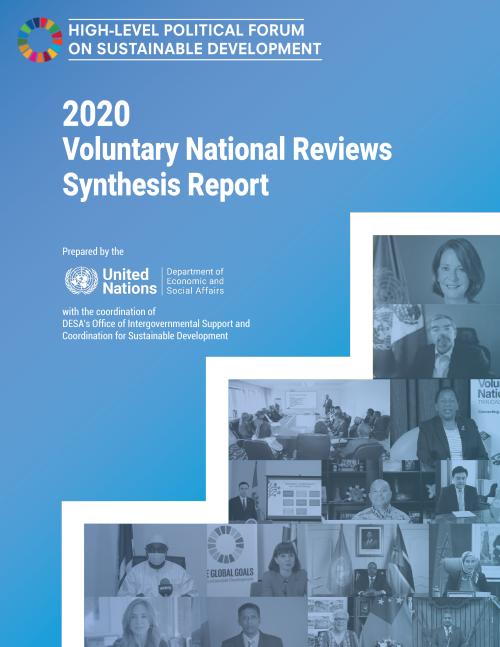
Despite the sudden onset of the COVID-19 pandemic and its global impacts, 47 countries presented their Voluntary National Reviews (VNRs) during the first virtual high-level political forum on sustainable development (HLPF) held under the auspices of the UN Economic and Social Council from 7 to 16 July 2020. Since 2016, when the first reviews were presented, a total of 168 countries have reported on their efforts to implement the 2030 Agenda for Sustainable Development and its Sustainable Development Goals (SDGs). With the launch this year of the Decade of Action and Delivery for sustainable development, some countries reaffirmed their commitment to the principles of the 2030 Agenda and…
Governments must take immediate steps to prevent a potentially devastating debt crisis and address the economic and financial havoc wrought by the COVID-19 pandemic – says a new report from the United Nations-led Inter-Agency Task Force on Financing for Development.
The UN System’s 2020 Financing for Sustainable Development Report outlines measures to address the impact of the unfolding global recession and financial turmoil, especially in the world’s poorest countries. Its recommendations are based on joint research and analysis from the UN System, the International Monetary Fund, World Bank Group, and more than 60 UN agencies and international institutions.
Even before…
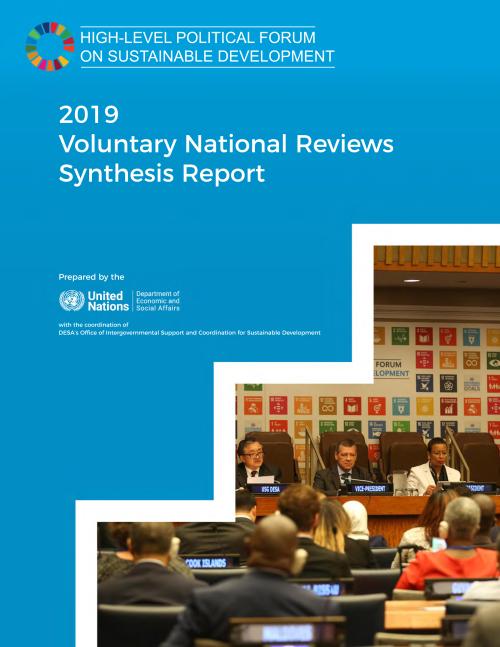
47 countries presented their Voluntary National Reviews (VNR) at the High-level Political Forum on Sustainable Development (HLPF) under the auspices of the UN Economic and Social Council, held in New York from 9 to 18 July 2019. Since 2016, when the first reviews were presented, a total of 142 countries have reported on their efforts to implement the 2030 Agenda for Sustainable Development and its 17 Sustainable Development Goals (SDGs).
As in previous years, this report provides an overview of the approaches and actions taken by all countries reporting in 2019 and showcases best practices, lessons learned, gaps and challenges encountered in working towards the achievement of the…
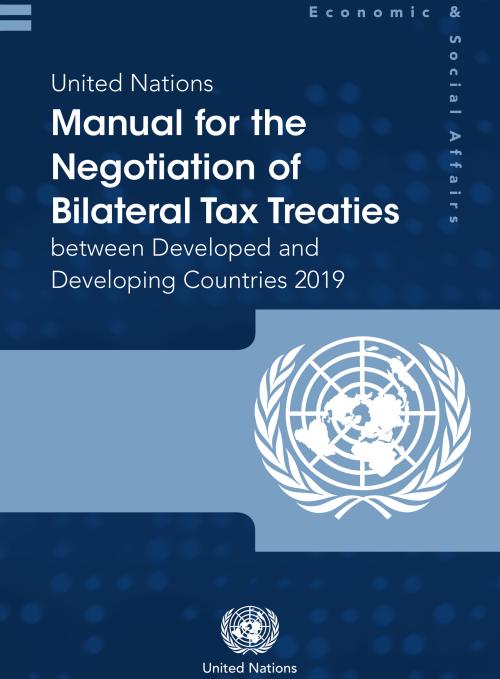
The United Nations Manual for the Negotiation of Bilateral Tax Treaties between Developed and Developing Countries (2019) is a compact training tool for beginners with limited experience in tax treaty negotiation. It seeks to provide practical guidance to tax treaty negotiators in developing countries, in particular those who negotiate based on the United Nations Model Double Taxation Convention between Developed and Developing Countries. It deals with all the basic aspects of tax treaty negotiation and it is focused on the realities and stages of capacity development of developing countries.
While every country should form its own policy considerations and define…
The 2019 Financing for Sustainable Development Report (FSDR) of the Inter-agency Task Force on Financing for Development warns that mobilizing sufficient financing remains a major challenge in implementing the 2030 Agenda for Sustainable Development. Despite signs of progress, investments that are critical to achieving the Sustainable Development Goals (SDGs) remain underfunded and parts of the multilateral system are under strain.
The FSDR recommends that the international community should use this opportunity to reshape both national and international financial systems in line with sustainable development. If we fail to do so, we will fail to deliver the 2030…
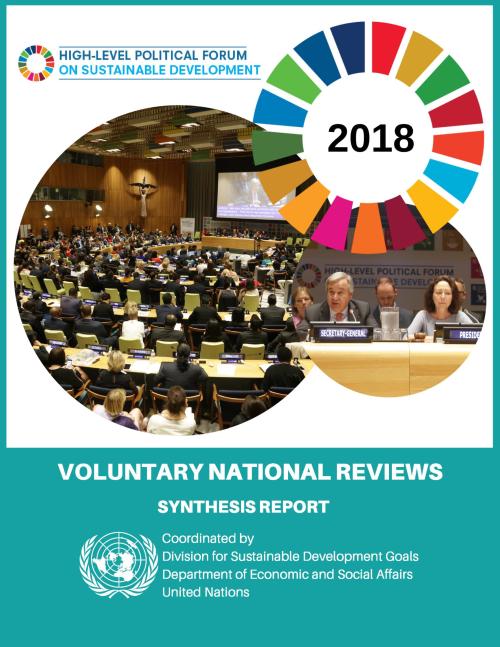
The 2018 High-Level Political Forum (HLPF) on sustainable development took place from 9 to 18 July. A total of 46 countries presented voluntary national reviews, up from 43 countries that conducted reviews in 2017. Since the inaugural reviews in 2016, 111 reviews have been presented, by 102 countries, with a number of countries conducting second reviews. Looking ahead to the 2019 HLPF, it is anticipated that 51 countries will present their national reviews, of which 41 will be doing so for the first time.
The voluntary national reviews document how countries are tackling the transformative challenge of the 2030 Agenda. The reviews are country-specific and complement the broader…
The 2018 report of the Inter-agency Task Force on Financing for Development finds that most types of development financing flows increased in 2017, and that there has been progress across all the action areas of the Addis Ababa Action Agenda. This progress was underpinned by an upturn in the world economy, but at the same time the report warns that risks could derail development progress and structural impediments continue to undermine sustainable development prospects.
The 2018 report provides policy options which, if implemented, would put the world on a sustained and sustainable growth and development path. It also examines the financing challenges to the SDGs under…
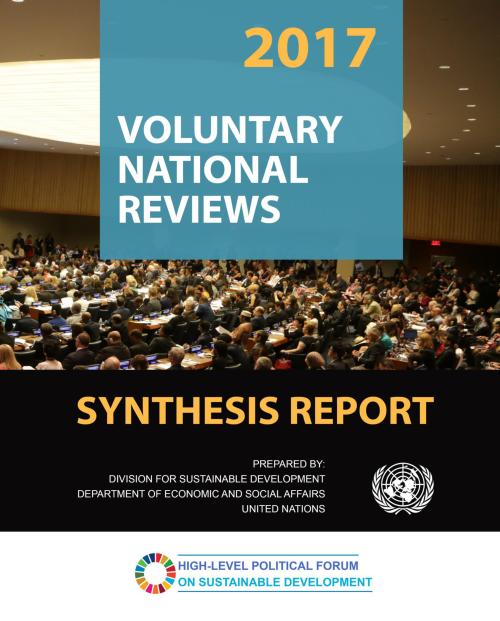
The 2017 meeting of the High-Level Political Forum on Sustainable Development (HLPF) took place from 10 to 19 July. A total of 43 countries presented voluntary national reviews, up from 22 countries that presented inaugural reviews at the 2016 HLPF. With this, more than a third of countries will have conducted a voluntary national review, sharing progress, experiences, lessons learned and challenges in implementing the 2030 Agenda. Looking ahead, at the 2018 HLPF, 47 countries will present their national reviews. Four of these will be conducting their second review at the HLPF (Colombia, Egypt, Mexico, and Switzerland) and one country its third (Togo). This report synthesizes some of the…
Continued slow global economic growth is likely to leave about 6.5 per cent of the world population extremely poor in 2030 without national actions supported by international cooperation, according to a new report issued by the United Nations today.
A continuation of the status quo would severely hamper efforts to achieve the Sustainable Development Goals by 2030. The Goals call for eliminating poverty by 2030.
According to the 2017 “Financing for Development: Progress and Prospects” report, under current trends, least developed countries (LDCs) are likely to fall short by large margins.
Projections indicating that global gross product will grow at less than 3…
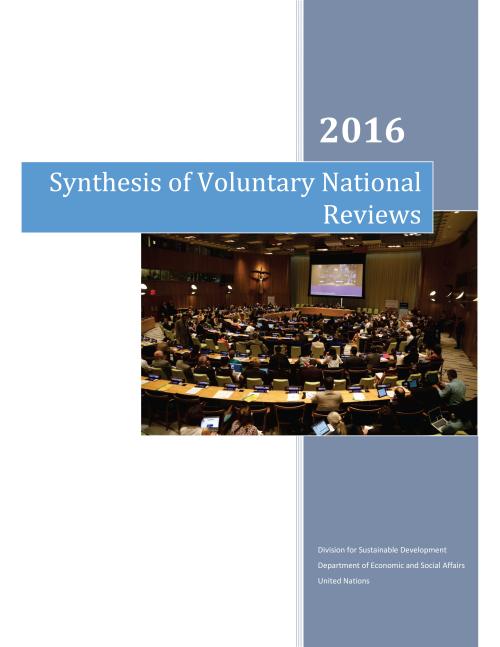
The 2016 meeting of the High-Level Political Forum (HLPF) took place from 11 to 20 July 2016 at the United Nations Headquarters in New York. Twenty-two countries presented voluntary national reviews (VNRs) of the implementation of the 2030 Agenda, and particularly the sustainable development goals (SDGs), over a day and a half during the Ministerial Segment of the HLPF under the auspices of the Economic and Social Council (ECOSOC). This report synthesizes some of the findings of the VNRs, drawing primarily from the written reports and executive summaries of the majority of countries. It uses a theme based analysis drawn largely from the voluntary common guidelines contained in the Annex…
The first edition of the report of the Inter-agency Task Force on Financing for Development maps out the commitments and action items contained in the Addis Ababa Action Agenda and lays out how the Task Force will monitor their implementation in future years.
The Task Force has carefully gone through the full range of these commitments and action items to create a framework for monitoring. It compiled them into nine chapters — on cross-cutting issues, the seven action areas of the Addis Agenda, and on data. In each chapter, commitments and actions are organized by thematic clusters, for which the Task Force presents options for monitoring.
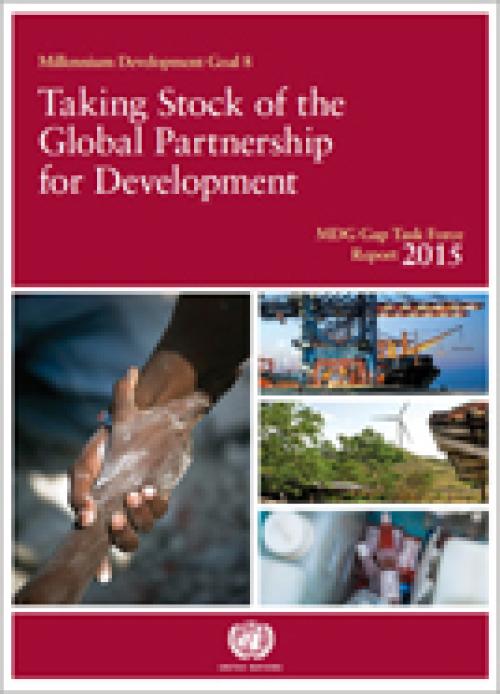
The Millennium Development Goals (MDGs) achieved significant progress over the past 15 years, but persistent gaps in official development assistance and an insufficient access to markets, affordable medicines and new technologies have highlighted the need for a rejuvenation of the global partnership for development, according to a new report launched today by United Nations Secretary-General Ban Ki-moon.
The “Taking Stock of the Global Partnership for Development” report of the United Nations MDG Gap Task Force monitors the recent achievements and challenges in the implementation of the Millennium Development Goal 8, while looking ahead towards the new…
 Welcome to the United Nations
Welcome to the United Nations